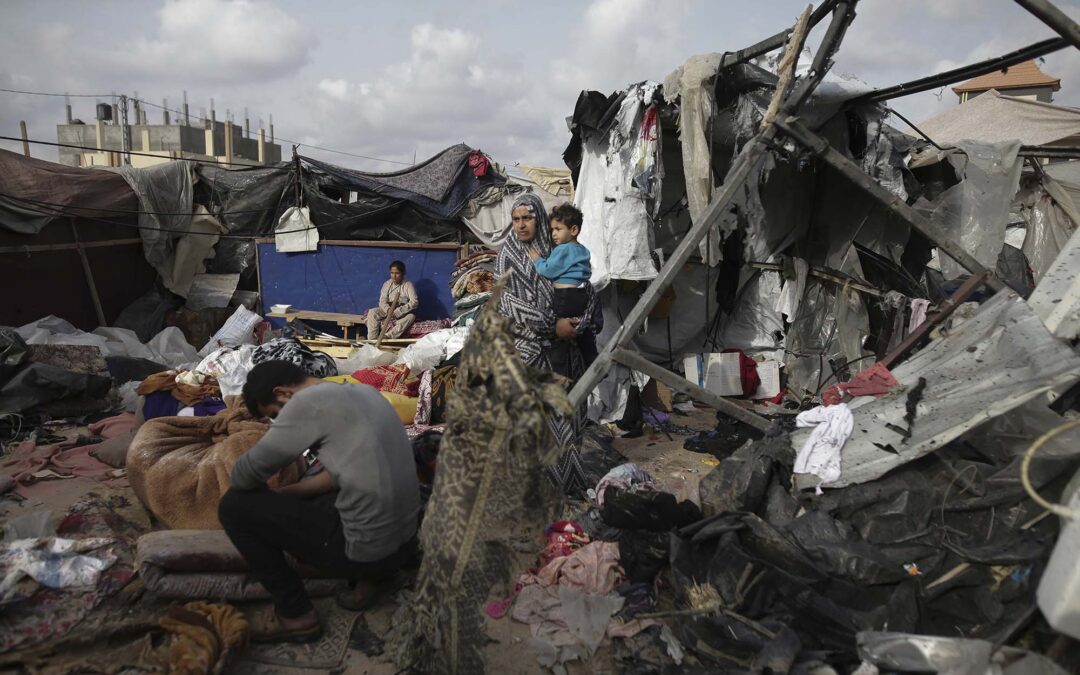Displaced Palestinians inspect their tents destroyed by Israel’s bombardment, adjunct to an UNRWA facility west of Rafah city, Gaza Strip, Tuesday, May 28, 2024. (AP Photo/Jehad Alshrafi)
From the Editor’s Desk of Aalia Lanius
As a person who has a personal connection to both Palestinian and Lebanese heritage and history, the past 14 months have been a profoundly painful chapter. Watching history, identity, and humanity being stripped away is devastating—not just for my family but for anyone who values human rights and justice. And yet, there is hope, because we all have the power to take meaningful action.
A Grim Confirmation
Amnesty International’s findings, detailed in their recent report, state plainly that Israel’s actions in Gaza constitute genocide. This conclusion builds on a mounting body of evidence: indiscriminate bombings, the targeting of civilian infrastructure, and the blockade of essential supplies such as food, water, and medical aid. The destruction is systematic, and its aim is unmistakable: to eradicate the Palestinian presence in Gaza.
The Lancet medical journal corroborates the scope of this devastation. By mid-June 2024, it conservatively estimated that at least 186,000 Palestinians—roughly 7.9% of Gaza’s population—had been killed, with the death toll will likely exceed 335,000 by the end of December 2024, if current trends persist. Amnesty’s report calls this what it is: genocide.
Warnings from Human Rights Organizations
For over a year, leading human rights organizations have sounded the alarm about the escalation of violence. Human Rights Watch, B’Tselem, and Physicians for Human Rights-Israel, among others, have repeatedly documented war crimes and crimes against humanity. Now, Amnesty’s declaration reinforces what has long been evident: this is not merely a conflict; it is an atrocity.
Even UNSUGARCOATED Media, as a nonprofit committed to exposing the social impact of world events, has been vocal in calling for urgent international action. Genocide is not just a legal term—it’s a moral indictment against the global community’s failure to intervene.
The Role of the Media
The media has often failed to provide an honest account of the situation. Those advocating for Palestinian rights are frequently mischaracterized as radicals, with labels such as “pro-Palestinian” or “anti-Israel”, a tactic designed to delegitimize the cause of human rights and those that are brave enough to defend them. But the truth is far simpler: the call to defend Palestinian lives is not radical; it is the bare minimum of our shared humanity.
This disinformation campaign obscures the reality on the ground. While Israel defends its actions under the guise of self-defense, its military capabilities—such as the Iron Dome and mandatory bomb shelters—reflect a nation prepared for offense rather than survival. Meanwhile, Gaza’s 2.2 million residents are left defenseless, facing bombs with no shelter and an unrelenting blockade.
Global Responsibility: What Can You Do?
Stopping a genocide requires a collective effort, but not everyone can or should act in the same way. Here’s how you can contribute:
- The Educator: Learn the history and context of the crisis. Understand why this is not just about two sides but about systemic oppression. Share this knowledge with those around you.
- The Advocate: Support organizations like Amnesty International that document human rights violations. Amplify their findings and call for accountability.
- The Consumer: Divest from companies complicit in oppression. Spend your money where it supports human rights and justice.
- The Protester: Join marches, rallies, and demonstrations. Let your presence be a visible stand against injustice.
- The Creative: Use your platform to highlight the humanity of the oppressed. Stories, art, music, and film can shape perspectives and inspire change.
A Roadmap to Accountability
Realistically, not everyone can do everything, but everyone can do something. Start by asking yourself:
- Are you willing to change your spending habits?
- Are you prepared to confront difficult truths and share them?
- Are you ready to lend your voice, time, or resources to the cause?
By choosing even one of these roles, you contribute to a global movement that says enough is enough.
Humanity’s Collective Responsibility
Fascism and genocide do not remain isolated. They ripple across borders, destabilizing the global order and eroding humanity’s collective moral fabric. The U.S., tied to Israel through military aid and political alliances, bears a unique responsibility to act. This is not about taking sides; it is about upholding universal principles of justice, equality, and human dignity. Human rights are not selective. They belong to everyone. When we see evil and wrong, we must stand against it—not just for those suffering today but for the principles of justice and humanity that define us all.
As Amnesty International and countless other organizations have made clear, silence is complicity. The question is no longer whether genocide is occurring—it is whether we, as a global community, will act to stop it.
This is our moment to stand for humanity. What role will you play?
About the Author
Aalia Lanius is a Certified Human Rights Advocate, International Business Owner, and Multiple Award-winning Novelist. As the Founder and Editor-in-Chief of UNSUGARCOATED Media, Aalia is dedicated to exposing the social impact of world events and advocates indiscriminately for education, objectivity, and humanity through storytelling and journalism.

